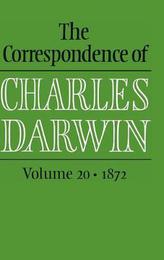
|
The Correspondence of Charles Darwin: Volume 20, 1872
Hardback
Main Details
Description
This volume is part of the definitive edition of letters written by and to Charles Darwin, the most celebrated naturalist of the nineteenth century. Notes and appendixes put these fascinating and wide-ranging letters in context, making the letters accessible to both scholars and general readers. Darwin depended on correspondence to collect data from all over the world and to discuss his emerging ideas with scientific colleagues, many of whom he never met in person. The letters are published chronologically: volume 20 includes letters from 1872, the year in which The Expression of the Emotions in Man and Animals was published, making ground-breaking use of photography. Also in this year, the sixth and final edition of On the Origin of Species was published and Darwin resumed his work on carnivorous plants and plant movement, finding unexpected similarities between the plant and animal kingdoms.
Author Biography
Frederick Burkhardt (1912-2007), the founder of the Darwin Correspondence Project, was president of Bennington College, Vermont, 1947-57 and president of the American Council of Learned Societies, 1957-74. Before founding the Darwin Correspondence Project in 1974, he was already at work on an edition of the papers of the philosopher William James. He received the Modern Language Association of America's first Morton N. Cohen Award for a Distinguished Edition of Letters in 1991, the Founder's Medal of the Society for the History of Natural History in 1997, the Thomas Jefferson Gold Medal of the American Philosophical Society in 2003 and a special citation for outstanding service to the history of science from the History of Science Society in 2005. James A. Secord has served as Director of the Darwin Correspondence Project since 2006. He is Professor of History and Philosophy of Science at the University of Cambridge and a fellow of Christ's College. Besides his work for the Darwin Project, his research focuses on the history of science from the late eighteenth to the early twentieth centuries. His book, Victorian Sensation: The Extraordinary Publication, Reception, and Secret Authorship of Vestiges of the Natural History of Creation (2000), won the Pfizer Prize of the History of Science Society.
Reviews'A mine of information.' The Times Higher Education Supplement 'This volume is packed with interesting information. How much I look forward to the volumes that take us through the next ten years, to the end in 1882. I used to think, forty years ago, when I and other Darwin scholars were rampaging through the vast holdings in the University Library at Cambridge, that we would have used up all of the good material and left little for the next generation. Now I see how wrong I was. We have a good basic idea of Darwin the man and scientist. How much there is still to learn about the influences and implications. Rightly, the Darwin correspondence will give work for years to come.' Michael Ruse, The Quarterly Review of Biology Review of volumes 19 and 20: 'The editing and organization of these volumes is, as always, superb; the Darwin Correspondence really does set the standard against which all comparable projects have to be measured. In addition to a wonderfully erudite editorial apparatus (the footnotes alone contain a wealth of invaluable information), all the surviving letters Darwin received are published ... as well as by dates, topics and so on ... the importance and usefulness of these volumes go well beyond the world of Darwin, or even studies of the many forms of nineteenth-century evolutionism. No Victorianist should be without them.' Jim Endersby, British Journal for the History of Science Review of volumes 20 and 21: 'Each volume contains an introduction, a chronology, a bibliography, a biographical register, and a wealth of footnotes, all of which help the reader to navigate the text. There is also a variety of supplementary material, including well-chosen illustrations.' Michael Ghiselin, Isis
|